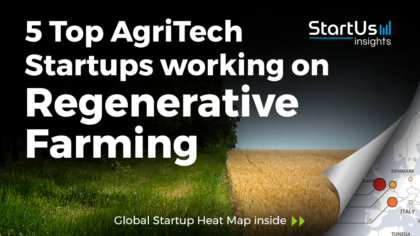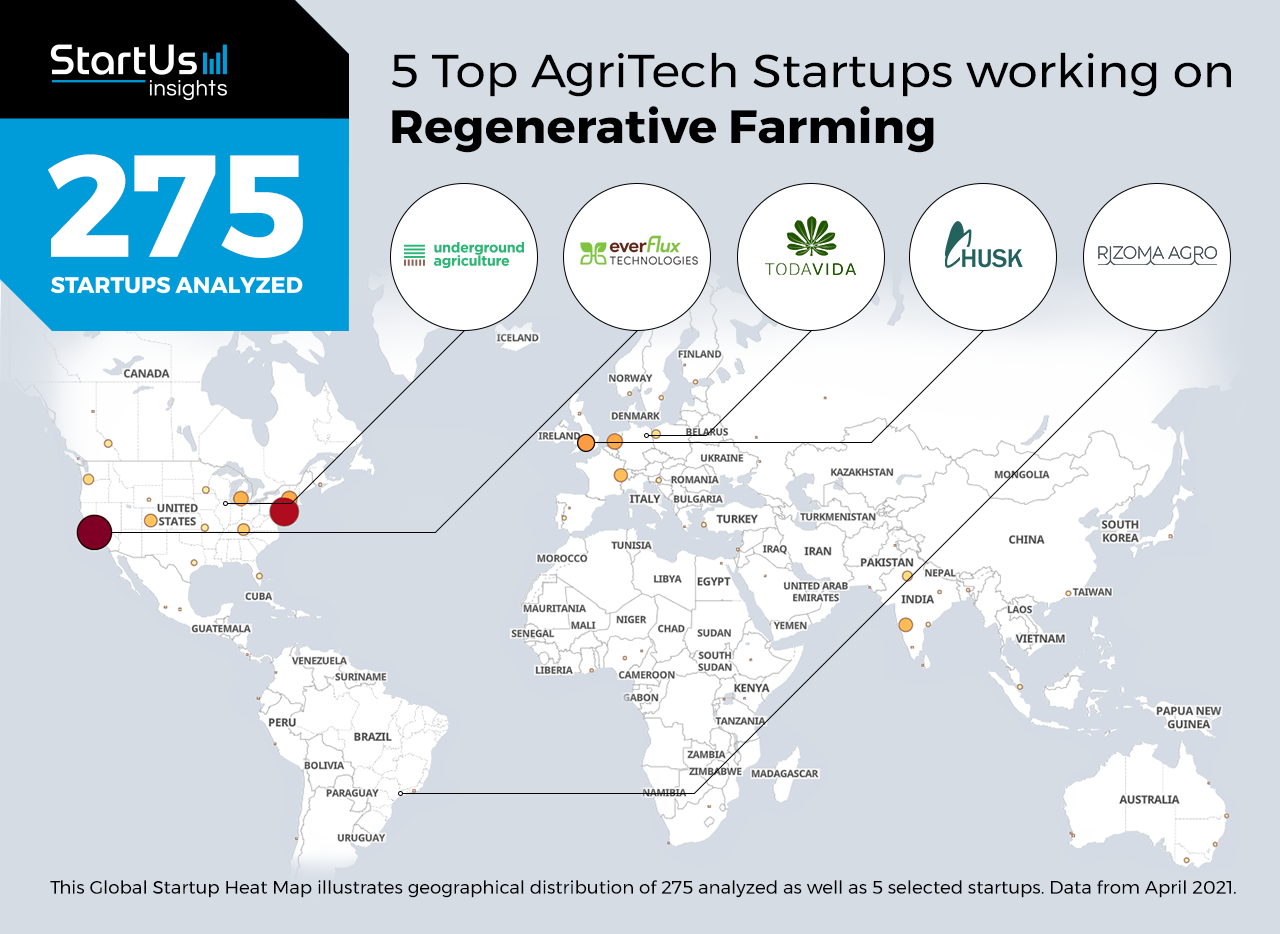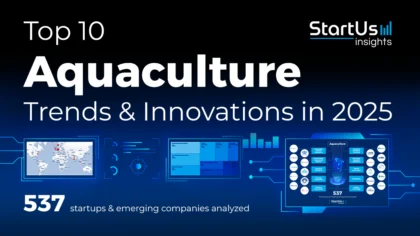Accelerate Productivity in 2025
Reignite Growth Despite the Global Slowdown
Staying ahead of the technology curve means strengthening your competitive advantage. That is why we give you data-driven innovation insights into the agriculture industry. This time, you get to discover 5 hand-picked regenerative farming startups.
Global Startup Heat Map highlights 5 Top Regenerative Farming Startups out of 275
The insights of this data-driven analysis are derived from the Big Data & Artificial Intelligence-powered StartUs Insights Discovery Platform, covering 2.093.000+ startups & scaleups globally. The platform gives you an exhaustive overview of emerging technologies & relevant startups within a specific field in just a few clicks.
The Global Startup Heat Map below reveals the distribution of the 275 exemplary startups & scaleups we analyzed for this research. Further, it highlights 5 regenerative farming startups that we hand-picked based on criteria such as founding year, location, funding raised, and more. You get to explore the solutions of these 5 startups & scaleups in this report. For insights on the other 270 regenerative farming startups, get in touch.
Rizoma Agro develops Regenerative Organic Agriculture
Carbon, being an important soil component, improves the soil structure, water retention, and overall fertility. However, unsustainable agricultural practices such as chemical fertilization and overproduction reduce soil organic matter (SOM), the most common form of soil carbon. Therefore, startups develop regenerative agriculture practices such as organic farming and no-till to improve the health and carbon storage capacities of soil.
Brazilian startup Rizoma Agro works on regenerative organic agriculture practices for the farming of corn, soy, and fruits. The startup practices crop rotation and agroforestry, as well as utilizes crop-livestock and silvopastoral farming systems. Additionally, Rizoma Agro applies irrigation management to avoid waterlogging and resulting crop diseases. The regenerative farming practices allow the startup to increase SOM and biodiversity, resulting in increased soil carbon sequestration.
Underground Agriculture develops Tools for Regenerative Agriculture
Effective soil carbon sequestration requires continuous maintenance of appropriate agricultural practices. Improper cultivation leads to the release of the stored carbon. The implementation and maintenance of cover crop management, weed control, and no-till require specific agricultural seeding and cultivation tools. Therefore, startups develop seeding, tillage, and cultivation devices.
US-based startup Underground Agriculture develops tools for regenerative agriculture. The startup designs and manufactures a roller-crimper for no-till farming, a duoseeder for dual crop seeding, and a row tillage tool for weed control. Underground Agriculture’s devices allow farmers to efficiently maintain regenerative agriculture practices that prevent the release of the stored carbon.
Everflux offers Organic Fertilization
Common agricultural practices, centered around growing a single culture on one field for many years, involve the application of synthetic fertilization for higher yield on malnourished soil. When growers decide to switch to regenerative farming practices and abandon synthetic fertilizers, they lose yield and the resulting income for several seasons while the land recovers. To this avail, startups develop organic fertilizers to facilitate the transition to regenerative agriculture.
US-based startup Everflux provides organic fertilization solutions for farmers and growers, helping them transition to regenerative agriculture. The startup’s product, Bioflux, fertilizes the soil with microbes, improving root development, plant growth, and soil organic matter. Additionally, the startup offers biochar blends and byproducts to increase soil fertility and keep high yields during the transition.
Husk produces Biochar Fertilizers
The utilization of biochar in agriculture increases soil carbon, microbial diversity, and water retention. Additionally, turning biomass into biochar allows for a transformation of the carbon dioxide captured from the atmosphere into a solid form and its storage in the soil. Startups work on biochar production and applications for carbon sequestration and soil fertilization.
British startup Husk works on biochar-based fertilizers. The startup produces biochar products through the pyrolysis of agricultural waste. Additionally, HUSK cooperates with international organizations to scale biochar applications in regenerative agriculture practices on smallholder farms across the world.
TodaVida advances Agroforestry
Agroforestry combines trees and agricultural practices into a single ecosystem, in which trees grow around or among crops. This regenerative agriculture practice allows farmers to create a cultivation system that increases biodiversity, stores carbon dioxide and regenerates the soil. This is why AgriTech startups work on the design and implementation of agroforestry systems.
German startup TodaVida implements agroforestry in degraded areas of Brazil. The startup helps small farms transform their agricultural practices into agroforestry systems. TodaVida’s cooperation with farmers produces organic food, increases soil health, and contributes to rainforest restoration.
Discover more AgriTech startups
AgriTech startups, such as the 5 examples highlighted in this report, focus on sustainable agriculture, blockchain, and agriculture supply chain. While all of these technologies play a major role in advancing the agriculture industry, they only represent the tip of the iceberg. To explore more AgriTech technologies, simply get in touch to let us look into your areas of interest. For a more general overview, you can download our free AgriTech Innovation Report to save your time and improve strategic decision-making.








